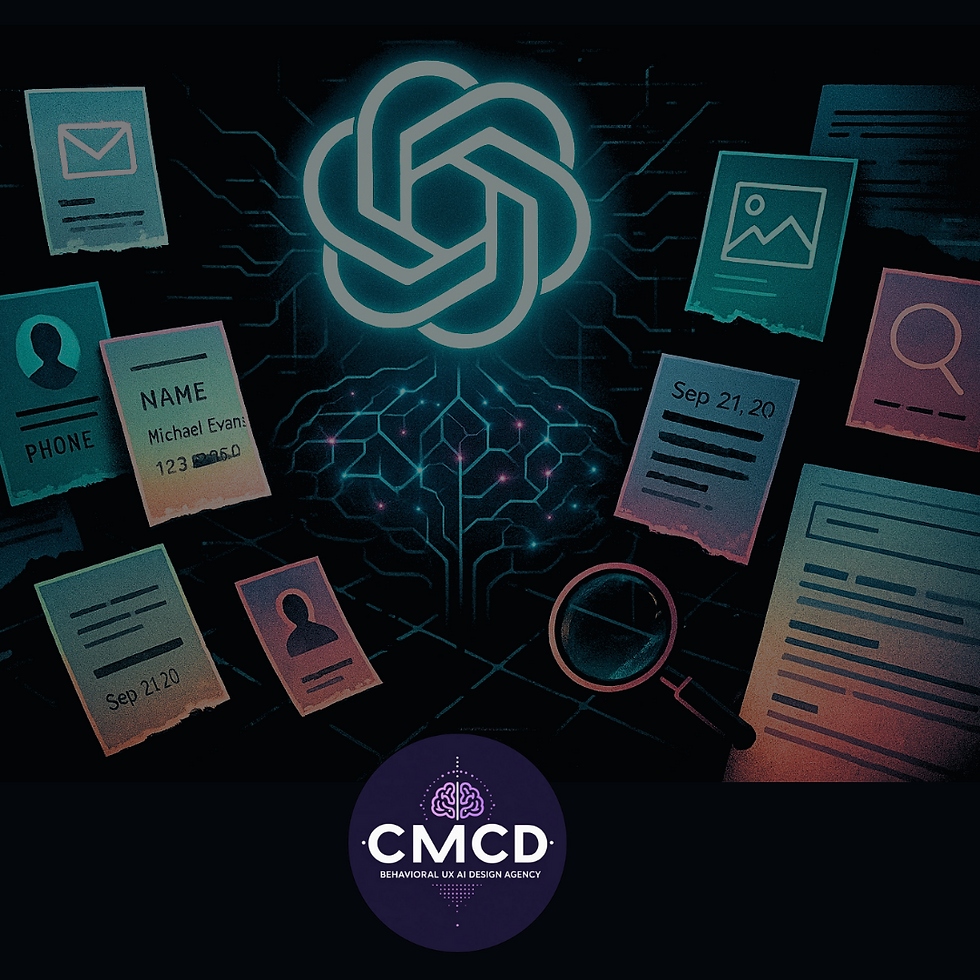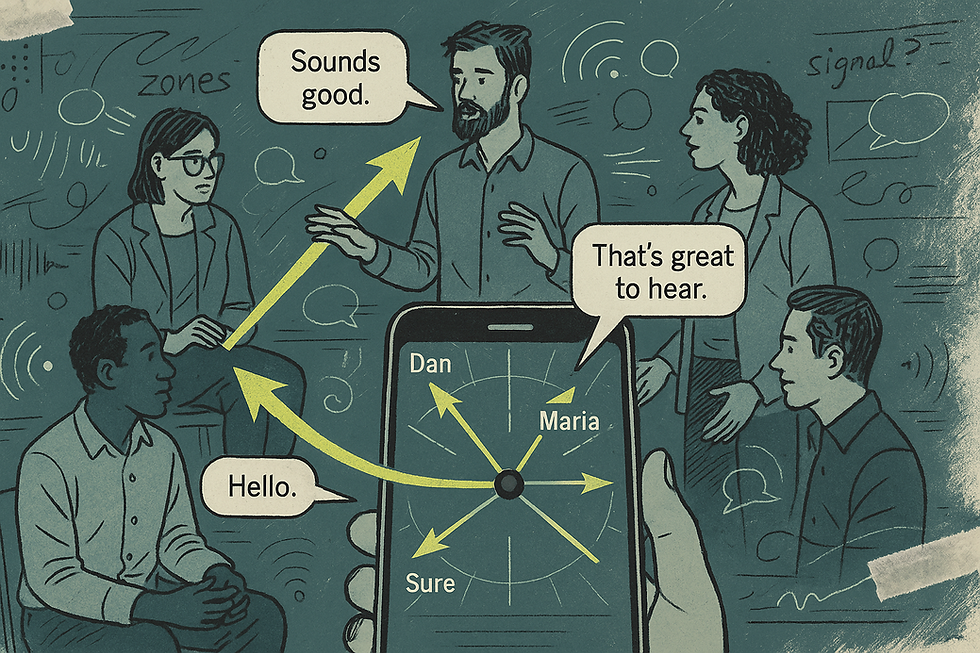The AI Revolution in SEO and Digital Marketing: Navigating the New Paradigm
- Emily Neuhoff
- Jul 24
- 5 min read
How artificial intelligence is reshaping the digital landscape and what it means for businesses in 2025 and beyond
The Convergence Point
We stand at an unprecedented inflection point in digital marketing. While we have always been in. thebusiness of maximizing user engagement with proven strategies-[-the convergence of sophisticated AI technologies, evolving search algorithms, and changing consumer behaviors has fundamentally altered how businesses must approach their digital presence. What worked in SEO and digital marketing just two years ago is not merely outdated—it's potentially counterproductive.
The traditional playbook of keyword density, link farms, and generic content production has been replaced by a new paradigm that demands authenticity, expertise, and genuine value creation. This shift isn't just technological; it's philosophical, requiring marketers to reimagine their relationship with both algorithms and audiences.
The AI-Powered Search Evolution
Google's integration of AI through technologies like BERT, MUM, and now SGE (Search Generative Experience) represents more than incremental improvement—it's a fundamental reimagining of how search engines understand and respond to human intent. These systems don't just match keywords; they comprehend context, nuance, and the deeper meaning behind queries.
Consider the implications: when someone searches for "best marketing strategy for small business," AI-powered search engines now understand this isn't just about matching those specific words. They recognize the searcher's need for actionable, context-specific advice that considers industry, budget constraints, and competitive landscape. The algorithm can distinguish between generic listicles and genuinely helpful, expert guidance.
This evolution has profound implications for content strategy. The era of thin, keyword-stuffed content is definitively over. Search engines now reward depth, expertise, and genuine utility. They can identify when content truly serves user intent versus when it merely attempts to game algorithmic preferences.

The New Content Paradigm
In this AI-driven landscape, content excellence isn't just about quality—it's about demonstrating genuine expertise and authority. Google's E-A-T (Expertise, Authoritativeness, Trustworthiness) framework has evolved into E-E-A-T, adding "Experience" as a crucial factor. This addition signals that search engines now value first-hand experience and practical knowledge over theoretical expertise alone.
Successful content strategies must now focus on:
Semantic Richness: Rather than targeting specific keywords, content must comprehensively address topics with semantic depth. AI understands related concepts, synonyms, and the broader context around subjects. Content that naturally incorporates this semantic richness will outperform keyword-focused approaches.
User Journey Mapping: AI-powered analytics can now track and understand complex, multi-touchpoint customer journeys. Marketers must create content that serves users at each stage of this journey, from initial awareness through post-purchase advocacy.
Personalization at Scale: AI enables unprecedented personalization capabilities. The most successful digital marketing strategies now leverage AI to deliver personalized experiences that feel one-to-one while operating at massive scale.
The Authenticity Imperative
Perhaps the most significant shift in the AI era is the premium placed on authenticity. As AI-generated content becomes ubiquitous, search engines and users alike have developed sophisticated mechanisms for identifying and preferring genuine, human-created content that reflects real expertise and experience.
This creates both a challenge and an opportunity. The challenge lies in competing with the volume and speed of AI-generated content. The opportunity exists in the increasing value placed on authentic, expert-driven content that AI cannot replicate—yet.
Brands that succeed in this environment will be those that use AI as a tool to amplify their authentic expertise rather than replace it. AI excels at analysis, optimization, and personalization, but it cannot substitute for genuine industry knowledge, real customer relationships, and authentic brand voice.
Technical SEO in the AI Age
Technical SEO has become more critical and more complex. AI-powered search engines can process and understand technical elements with unprecedented sophistication, making technical excellence both more rewarding and more necessary.
Key areas of focus include:
Core Web Vitals and User Experience: AI algorithms increasingly prioritize user experience signals. Page load speed, mobile responsiveness, and overall site performance directly impact rankings more than ever before.
Structured Data and Schema Markup: AI relies heavily on structured data to understand content context and relationships. Comprehensive schema implementation helps AI systems properly categorize and surface content.
AI-Optimized Site Architecture: Site architecture must now consider how AI crawlers navigate and understand site relationships. This includes intelligent internal linking, logical content hierarchies, and clear topical clustering.
The Rise of AI-Powered Tools and Automation
The democratization of AI tools has fundamentally changed the competitive landscape. Small businesses now have access to capabilities that were previously exclusive to enterprises with massive budgets. This levels the playing field in some ways while creating new competitive advantages for those who can effectively leverage these tools.
Successful digital marketers are using AI for:
Predictive Analytics: AI can now predict customer behavior, optimal posting times, and content performance with remarkable accuracy. This enables proactive rather than reactive marketing strategies.
Dynamic Content Optimization: Real-time content optimization based on user behavior, preferences, and context is now possible at scale.
Automated A/B Testing: AI can continuously test and optimize campaigns, identifying winning variations faster and more accurately than traditional methods.
The Human-AI Collaboration Model
The most successful digital marketing strategies don't position AI as a replacement for human creativity and strategic thinking—they leverage AI as a powerful amplifier of human capabilities. This collaboration model recognizes that AI excels at data processing, pattern recognition, and optimization, while humans excel at creativity, strategic thinking, and authentic relationship building.
In practice, this means using AI to:
Analyze vast amounts of data to identify trends and opportunities
Automate routine optimization tasks
Personalize content delivery at scale
Predict and respond to customer needs proactively
While reserving human expertise for:
Strategic planning and creative direction
Building authentic relationships and community
Creating original, expert-driven content
Making nuanced decisions that require empathy and cultural understanding
Looking Forward: Preparing for What's Next
The pace of AI advancement shows no signs of slowing. Businesses that want to remain competitive must adopt a mindset of continuous adaptation and learning. This means:
Investing in AI Literacy: Teams must understand not just how to use AI tools, but how AI thinks and operates. This knowledge enables more effective collaboration with AI systems.
Building Flexible Systems: Marketing infrastructure must be designed for rapid iteration and testing. The ability to quickly adapt to new AI capabilities and algorithm changes becomes a competitive advantage.
Focusing on Foundational Strengths: While tactics may change rapidly, businesses that focus on building genuine expertise, authentic relationships, and valuable products or services create sustainable competitive advantages that transcend technological shifts.
The Strategic Imperative
The organizations that will thrive in this AI-transformed landscape are those that view artificial intelligence not as a threat to human creativity and expertise, but as a powerful tool for amplifying human capabilities and creating more meaningful connections with customers.
Success requires a fundamental shift in mindset—from competing against AI to collaborating with it, from trying to game algorithms to genuinely serving user needs, and from creating content for search engines to creating experiences for humans that search engines naturally reward.
The future belongs to businesses that can seamlessly blend AI's analytical power with human creativity, strategic thinking, and authentic expertise. In this new paradigm, the question isn't whether to embrace AI in your digital marketing strategy—it's how quickly and effectively you can integrate it while maintaining the human elements that create lasting competitive advantages.
The AI revolution in SEO and digital marketing isn't just changing tactics and tools—it's reshaping the entire relationship between businesses and their audiences. Those who understand and adapt to this new reality won't just survive the transition; they'll emerge stronger, more effective, and better positioned to serve their customers in an increasingly AI-powered world.
.png)




Comments